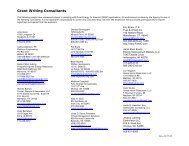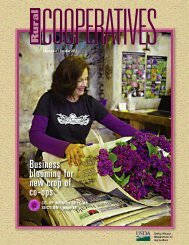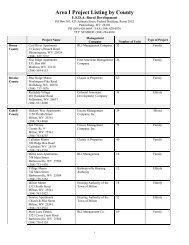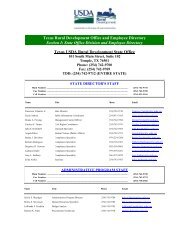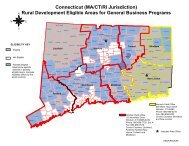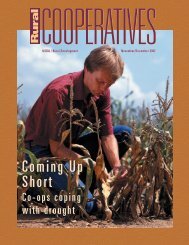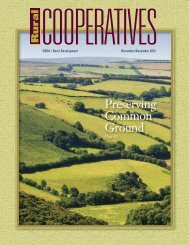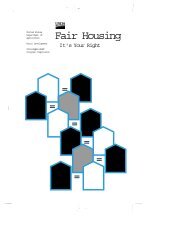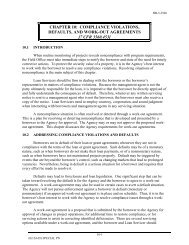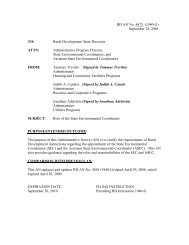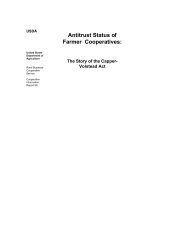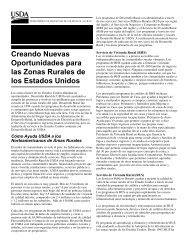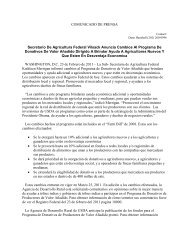How bike co-op went off track - USDA Rural Development - US ...
How bike co-op went off track - USDA Rural Development - US ...
How bike co-op went off track - USDA Rural Development - US ...
You also want an ePaper? Increase the reach of your titles
YUMPU automatically turns print PDFs into web optimized ePapers that Google loves.
some members, however. Once the<br />
machines were put into their new, more<br />
efficient positions, workers returning<br />
after the weekend found everything<br />
moved back to its original place.<br />
Parts standardized<br />
Other measures were put into the<br />
works to improve efficiency. The <strong>co</strong>-<strong>op</strong><br />
began working to standardize the parts<br />
that make up its various bicycle trailer<br />
models, which are now the largest selling<br />
brand in Germany (they meet stringent<br />
German safety <strong>co</strong>des) and <strong>co</strong>ntinue<br />
to expand sales in North America.<br />
Burley saved not only time and<br />
money, but cut back on greenhouse-gas<br />
emissions through the use of powder<br />
<strong>co</strong>ating for <strong>bike</strong> finishes. Powder <strong>co</strong>ating<br />
is more environmentally friendly<br />
than “wet spray” paint, because it doesn’t<br />
use volatile solvents. It also takes<br />
less skill and less time to apply. Wet<br />
spraying demands care and skill to<br />
apply the <strong>co</strong>at pr<strong>op</strong>erly — applying it<br />
too wet results in runs and sags; not<br />
wet enough results in a dull or<br />
“orange-peeled” finish.<br />
Powder <strong>co</strong>ating works by spraying a<br />
dry, electrically charged polymer powder<br />
onto the metal surface. The <strong>bike</strong><br />
frame is then placed in a large oven and<br />
heated. The powder melts and forms a<br />
hard, glossy protective finish. Besides<br />
being more efficient to apply, powder<br />
also gives a much tougher and more<br />
durable <strong>co</strong>at. The disadvantage of powder<br />
<strong>co</strong>ating is the sizeable capital expenditure<br />
required for the large oven to<br />
heat the painted items.<br />
Other upgrades included automation<br />
of various tasks, including wheel building<br />
and truing and the production of<br />
small parts. Ac<strong>co</strong>rding to Gehr, the<br />
“Some pe<strong>op</strong>le lost<br />
enthusiasm because<br />
they felt it was a<br />
betrayal of <strong>co</strong><strong>op</strong>erative<br />
principles.”<br />
automation reduced risk in <strong>co</strong>mparison<br />
to using outside suppliers: “By producing<br />
parts in-house, we’re not beholden<br />
to others for delivery.”<br />
In any case, the <strong>bike</strong> sh<strong>op</strong> worked, as<br />
Gehr put it, like a “<strong>co</strong>ttage industry,”<br />
with a huge number of different parts<br />
for the various models and a great deal<br />
of hand work. This doubtless <strong>co</strong>ntributed<br />
to a decision by the new owner<br />
to close down production of all bicycles.<br />
When interviewed last summer<br />
(prior to the <strong>co</strong>nversion), Lieberman<br />
and Gehr both said that the Burley<br />
board and management were well aware<br />
of these and other stumbling blocks to<br />
greater efficiency. “We’re making<br />
investments now that we should have<br />
made 5 years ago,” said Lieberman.<br />
Need for credit heralds change<br />
The need for credit for upgrades led<br />
to the <strong>co</strong><strong>op</strong>erative’s <strong>co</strong>nversion. The<br />
firm’s CEO, Char Ellingsworth, had<br />
been brought in from outside as the<br />
chief financial <strong>off</strong>icer. She was promoted<br />
when her predecessor left to use<br />
experience he gained at the <strong>co</strong><strong>op</strong>era-<br />
tive to engage in “lean manufacturing”<br />
training.<br />
One of Ellingsworth’s re<strong>co</strong>mmendations<br />
was a change in status to a worker-owned<br />
<strong>co</strong>rporation. At the time, the<br />
move was seen as solution to remaining<br />
true to the <strong>co</strong><strong>op</strong>erative spirit. The<br />
intent was not to issue stock to raise<br />
money, but to make the firm more<br />
attractive to lenders.<br />
Co<strong>op</strong>erative shares were to be <strong>co</strong>nverted<br />
pr<strong>op</strong>ortionately to stock shares.<br />
Current workers were to be issued <strong>co</strong>mmon<br />
stock, and former workers who<br />
still held membership were given preferred<br />
stock. There was to be no <strong>co</strong>ntrolling<br />
interest.<br />
The board voted unanimously in<br />
favor of the move. When the vote was<br />
put to the membership, a significant<br />
minority <strong>op</strong>posed it, seeing it as a<br />
betrayal of the <strong>co</strong><strong>op</strong>erative tradition.<br />
“There were definitely a lot of unhappy<br />
pe<strong>op</strong>le,” says Lieberman. Nevertheless,<br />
on June 23, 2006, the <strong>co</strong>-<strong>op</strong> voted to<br />
<strong>co</strong>nvert.<br />
The change apparently came too late<br />
to save worker ownership of the firm.<br />
By September, Burley had a huge backlog<br />
of orders — including more than<br />
3,000 trailer orders — which it was<br />
unable to fill because of a lack of cash<br />
to pay suppliers. A search for emergency<br />
funding resulted in an <strong>off</strong>er by a<br />
local businessman, Michael Coughlin,<br />
to purchase the <strong>co</strong>mpany’s assets and<br />
liabilities. The purchase <strong>went</strong> through<br />
on Sept. 8.<br />
Coughlin says he wants to keep<br />
Burley production in Eugene, unlike<br />
other producers in the market that have<br />
switched production overseas. <strong>How</strong>ever,<br />
while 53 jobs were retained, the rest of<br />
<strong>co</strong>ntinued on page 35<br />
<strong>Rural</strong> Co<strong>op</strong>eratives / November/December 2006 19




